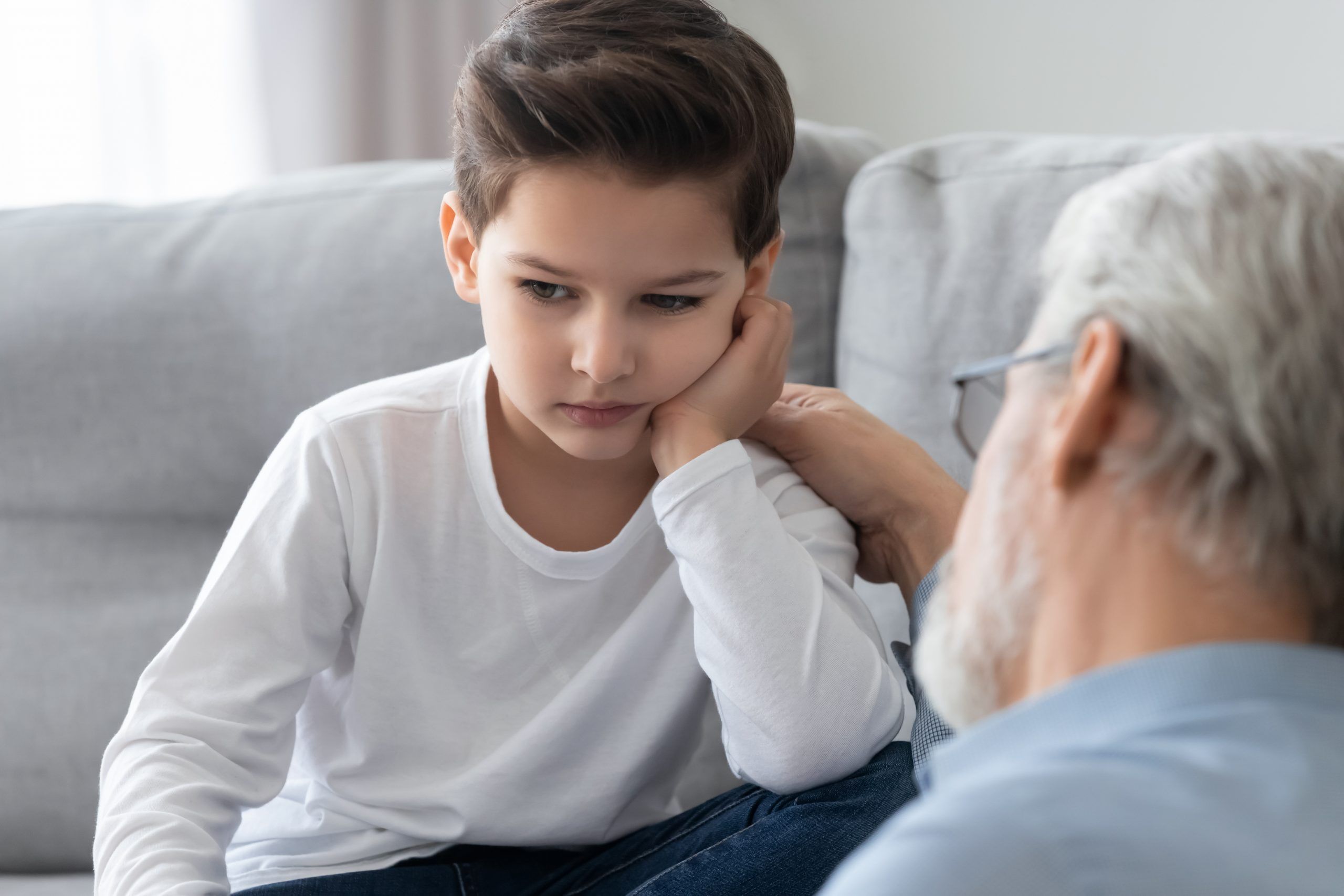Hard Conversations And Finding The Right Words
With the rise of more challenging situations, we all need tools to navigate our emotions and have proactive conversations with our kids. ~ Sarah Halloran

As parents, we all do everything we can to protect our children from things that might scare them. Like most of you, we struggle with how we should talk to our kids about different situations in the news in a way that would shelter them from worry but also answer their questions. So, we reached out to Parker Huston, PhD, a licensed clinical psychologist and the Clinical Director of the On Our Sleeves Program at Nationwide Children’s Hospital, where he advocates for children’s mental health on a local, regional, and national level. Parker was kind enough to sit down with us to give us tips for talking to the children in our lives about the potentially traumatic events they have been exposed to this week, we hope his insights will help you as much as they did us.
GoNoodle: How can parents better manage their own stress and anger when seeing these things on the news for the first time in a space where their kids can see their reactions?
Parker: First, parents need time to process difficult news themselves, so try to take time to think through and discuss an event before talking with your kids. I would also advise against letting kids watch the news alone without context. My daughter (age 8) and son (age 4) were trying to get a peek at the news we were watching today and we encouraged them to go do something else for a little while, until we could understand what was going on so we could talk about it as a family. I think it’s important we not expect young kids to process things like this in real time, so they don’t see something that could be harmful to them. Then, parents can share their own feelings but in an appropriate way based on where their kids are developmentally.
Looking for and then talking to our kids about positive things happening in the world can help us take a step back too. It’s easy to descend into our own heads about things, and talking to a kid about the positives can help an adult find calm. For example, I go online and look for people doing really great things so I can show my kids all of the good things happening in the world and people expressing their frustration in a way that is safe and kind. I’ll sit with my kids and watch John Krasinski’s Sharing Some Good News videos, search around on the Good News Network to find stories of kids and adults making powerful, positive changes in the world, or even find videos that show the power of peaceful protests. Either way, it’s important to bring our kids positive examples.
GoNoodle: Mr. Rogers had a famous quote, “My mom used to say, when the news is scary, look for the helpers.” What other advice do you have for parents when it comes to helping their kids deal with the stuff they are seeing in the news?
Parker: I often use that quote. I have also been focusing with my kids on telling them that for every person in the world who wants to cause harm to someone, there are a lot more people who don’t want to do that and who are really kind, whether or not they agree with each other. It’s important to remind kids that we can disagree but still care for each other.
My wife and I aim to be really proactive about things like this – after asking them how their day was at dinner, we asked them what they had seen and heard about the situation at the Capitol. We let them talk first. When it was time to express our feelings, we focused on language kids understand – like upset, frustrated, and sad – and then explained some of the reasons why. It’s important for adults to avoid sensationalizing – avoid telling kids, “I am terrified. I am overcome with fear. I feel overwhelmed or helpless.” Even if you feel that in the moment, use language that can speak more to their understanding of emotions while helping them feel like someone is still in control of the situation. Also, remember, as parents, it’s okay to not know all the answers. When my kids ask me questions like, “Why would people do something like this?” or “Do we know anyone that would do something like this?” I tell them that those are really good questions and I don’t have the answers – then I focus the conversation back on the things I do know, or that I can help them work through, like their personal safety. For example, my kids brought up, “What if something like that happens in our neighborhood, or at our house?” – and I worked to give them the context that there are actually some protests happening in our community but that it is part of my job – and their mom’s – to find a safe place to be, and that thankfully our home is a safe place.”
GoNoodle: Is there any age with kids where you should completely avoid these conversations and attempt to hide things like this from them?
Parker: I personally say no. Developmental researchers have shown that children as young as 3-years-old have a basic understanding that there are important people who help make rules for the people around them. There is no lower limit to when you can discuss the differences between how people make choices, why people make certain choices, how anger and frustrations can lead to choices we don’t agree with, and how you can resolve differences between people. It’s more about the words you choose – things like “mad,” “mean,” “bad choices” – can help take it down to their level. For example, kids’ understanding of what it means to break the law is different at different ages. Early on, the law is a set of directive rules to a kid – it’s hard to help them understand the nuances until later as their sense of morality develops. There are a lot of undertones that you have to qualify in different ways depending on the age and understanding of your kid.
GoNoodle: How can parents avoid putting their political views onto their kids? How can they separate politics from actions?
Parker: It’s become more and more difficult in the past several years, but I really try to divorce political affiliation with action and ideology. There are people of every political persuasion who use aggressive and violent means to get what they want. I try to instill in my kids that we disagree with the action or behavior regardless of the ideology behind it. I wrote an article on talking to your kids about politics, which might be helpful. Big picture, we want to avoid vilifying entire groups of people. It’s important to remind your kids in all of these situations that there are a lot more helpers in the world than there are people who want to cause harm.
GoNoodle: Regarding child behavior and mental/emotional health, what should parents look for in their children that might signify that there is something going on that needs to be addressed?
Parker: When it surrounds an event, you want to look for significant changes in the way they are playing, sleeping, eating, and talking about certain circumstances. If I’m spending time with my daughter tomorrow and all of a sudden she starts looking out the window asking, “Who is that person out there?” and she doesn’t usually do that, that might be a signal. Then I would ask her, “What are you thinking? What are you looking for out there?” Focus on open-ended questions as much as you can. Avoid putting words into their mouth, like “Oh are you worried about a violent protest happening outside our house?” because they may just be looking at a cute dog and you’ve then pushed them into a conversation when they weren’t even thinking about it.
Ask them what they’ve seen and heard – and what they think they know. Then reassure them in a realistic way which can sometimes just be, “I’m here to get through this with you. I’m here to help keep you safe.” And then leave the door open for further discussion. And, praise them when they show openness to ask you tough questions. My daughter asked me a question right before bed last night and I told her I was so glad that she felt like she could talk to me and tell me she was a little scared about what was happening.
GoNoodle: How does the way a child processes and understands stress differ from the way an adult might process stress?
Parker: Kids don’t think about stress as much. It’s an abstract construct to them. They understand the emotions that come with it and the feelings that they have. I suggest talking in more concrete language. “How does it make you feel to talk about this? What kinds of emotions did you have seeing that on TV or hearing about that story?”
Kids usually act out their stress. They don’t come home to you and say, “I had a really stressful day at school!” They come home and throw their back pack down and stomp up to their room and tell you that they don’t want to eat what you made for dinner or that they hate school. That is their way of saying, “I’m really feeling a lot of stress right now.” As parents, we can put a name to that and say, “Wow, you seem like you’re feeling really upset. Is something going on? What has you feeling upset right now?” Naming it in that way can help them process their stress.
As adults we’ve built coping and processing mechanisms – my wife will stress clean, take a walk, or exercise, I run a bunch of miles on my treadmill and listen to music or podcasts. Most kids don’t have those skills yet, we have to teach them. So we have to put a name to it to help them figure it out. Letting them choose an activity can help from there – ask them what they want to do together to relax in the afternoon, or if they want to read one of their favorite books, play a game, or go on a walk – letting them decide will help them cope in a way that makes sense for their age and might even help them build long-term stress relief methods.
* * *
For more tips from Dr. Parker, check out ‘Talking to Kids in Times of Tragedy’ and other articles on the On Our Sleeves community blog.

